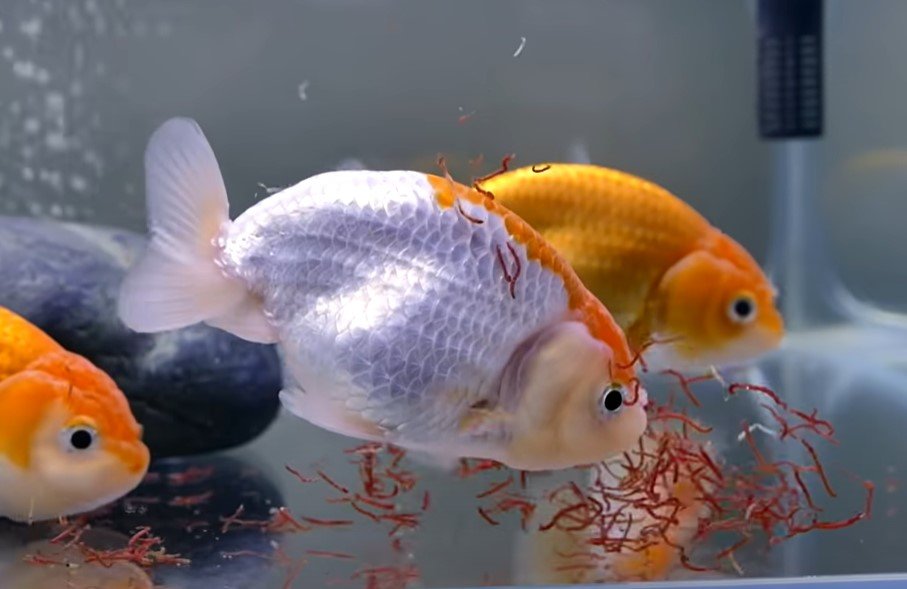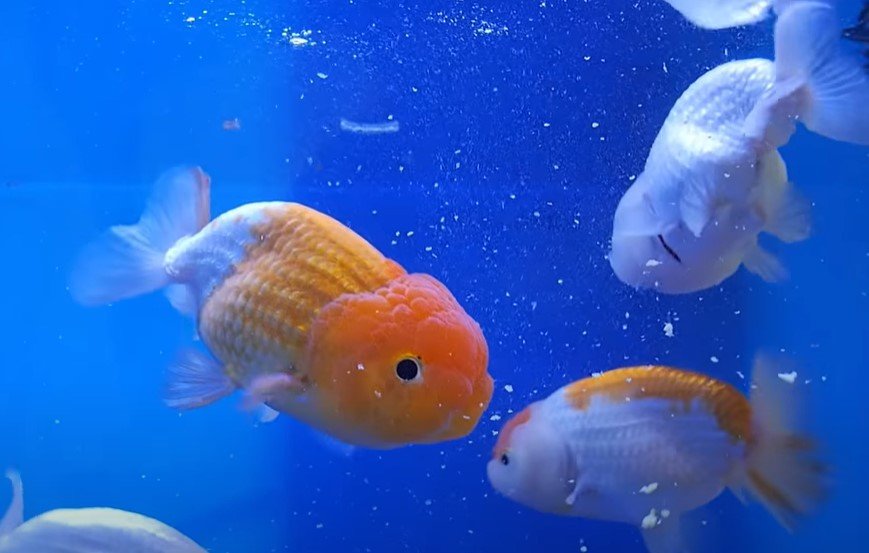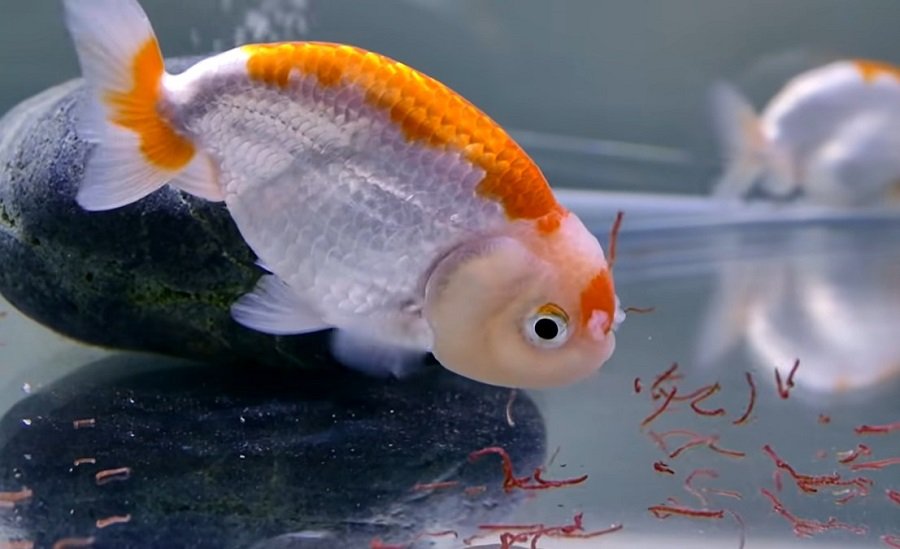As a whole, some of the best food options for goldfish include brine shrimp, Steamed egg, peas, bloodworms, daphnia, mosquito larvae, and tubifex worms, alongside some veggies. But, in the aquarium, Goldfish prefers a mixture of healthy diet including flakes, pellets, vegetables, and live food.

Goldfish are often not picky and would always feed on a variety of food as omnivorous eaters. Although these fish species are not fussy eaters and usually eat whatever is available, giving them a varied diet is essential to ensure they get all the nutrients they need.
The diet of a goldfish should include both plant and animal matter. Keep reading to know in details.
Why is a Goldfish’s Diet Important?
One top thing to remember when caring for goldfish is what to feed them. A healthy goldfish’s diet is essential for its overall health and well-being.
The diet of this fish is important not only for their physical health but also for their mental well-being. Thus, providing your goldfish with a healthy diet will help them live a long and happy life.
Goldfish are omnivores and always require both plant and animal matter in their diet. You should know that a well-balanced diet for a goldfish should consist of 50% vegetables and 50% protein.
What do Goldfish Eat?
A good diet for goldfish includes items such as algae, small insects, and zooplankton. While goldfish in an aquarium can survive on a diet of pellets or flake food, it is essential to supplement their diet with fresh vegetables and live or frozen foods.
Goldfish also eat vegetables such as lettuce, spinach, and zucchini. Fruit such as watermelons and grapes are also a good treat for goldfish.
If you are unfamiliar with what to feed your goldfish, you should try a variety of diets to help them maximize their health. Commercial feed formulated with unique granules and flakes for goldfish can serve as a staple food.
Aquarists keen on reducing the water contamination in their fish tank prefer to feed goldfish with floating pellets as they are effortless to get out. When there are many fishes within a tank, it is common for them to compete for food, and small-sized pellets would ensure each individual gets their share of food.

Your goldfish would also need some nutritional supplements, and you can provide such from a mix of veggies, live and frozen brine shrimp, and daphnia. Other added options include tiny invertebrates, scalded peas, and duckweed.
Although not exclusively, some fishkeepers add small amounts of mammalian fats to their goldfish diet. But, these mammalian fats from beef heart, offal, and meat are not suitable for goldfish. The problem lies with poor digestion, especially when the water gets freezing and the temperature falls below 15°C
How do you treat your Goldfish at home? 4 Best Goldfish Foods
1) A steamed egg is a high-protein food that promotes growth and beneficial for young goldfish and fry.
2) Bloodworms which have High protein content (freeze-dried bloodworms), enhance the color of fish and accelerate the growth.
Nutrition Evaluation: Frozen bloodworms
Crude Protein (min) 8.3% and Fat (min) 1.2%
Crude Fiber (max) 3.9% and Moisture (max) 81.7%
Nutrition Evaluation: Freeze-dried bloodworms
Crude Protein (min) 55% and Fat (min) 3%
Crude Fiber (max) 5%
3) Green Peas are high in fiber, which can help your goldfish avoid problems with constipation and their swim bladders.
4) Egg tofu is a good source of high-quality protein that increase vitality
How Often Should you Feed your Goldfish?
One of the critical things you need to do to keep your goldfish healthy is to feed them regularly.
But how often should you feed them? Goldfish are unlike other fish because they cannot go for long periods without food.
You should note that goldfish need to be fed daily, and they should be given as much food as they can finish and eat in one sitting. It is generally recommended that you feed your goldfish twice a day, once in the morning and once at night.
Although goldfish often do not get underfed, they can quickly get overfed and face some digestion issues. Each feeding should be small enough to allow the fish to eat all the food in a few minutes.

Overfeeding can lead to severe health problems for your goldfish, so it is essential to stick to this feeding schedule.
What Goldfish Shouldn’t Eat
A critical aspect of goldfish care is knowing what not to feed them. Some common foods that are harmful to goldfish include:
- Bread
- Crackers
- Chips
- Raw meat
- Cooked
- meat
- Dairy
- products
- Caffeine
Goldfish are also very sensitive and often get affected by changes in water temperature, so it’s essential to be careful when adding new water to their tank.
Always use room-temperature water when doing water changes, and avoid sudden temperature changes as much as possible.
Can Goldfish Stay Long without Food?
Goldfish are remarkably resilient creatures that can survive for long periods without food.
So, if you accidentally forget to feed your goldfish for a day or two, don’t worry – they’ll be just fine. Of course, this doesn’t mean you should neglect your goldfish and not feed them for long periods.
If you’re traveling or going away from home for more than a few days, it remains your best decision to leave your goldfish and not leave excess feed in the tank.
Alternatively, you can arrange for someone to feed your goldfish if you will be gone for a long time.
Feeding Tips for Goldfish
- Avoid giving your goldfish excess food, as they soon bloat themselves from overfeeding and face severe digestion problems.
- During lower temperatures below 8°C, do not give goldfish much food as these homoeothermic creatures digest food slowly in cold temperatures.
- Ignore the temptation of throwing bread crumbs into your goldfish tanks, and try to avoid mammalian fats for your goldfish’s diet.
- Be sure to clean the pond or tank after each meal, and kindly remove all uneaten food after two minutes.
How to Care for Goldfish Properly?
As a new fishkeeper, you should know a few things to help care for your goldfish. Below are simple tips to help ensure your goldfish stay healthy and happy.
- Be sure to get a sizable goldfish tank and set it up in a quiet area of your home. Goldfish need a spacious swimming area, so ensure you get a tank of at least 20 gallons.
- Install a filter and a pump to keep the water clean and oxygenated, as contamination can be very toxic and kill your goldfish.
- Consider adding some plants and decorations to the tank. Goldfish like to have hideouts and explore, so create a habitat that is rich in hiding spots and swimming areas.
Conclusion
What does a goldfish eat? Goldfish are common omnivorous pets that feed on both plants and animals. In the wild, goldfish eat various items, including insects, small fish, and plant matter.
A goldfish’s diet should be varied and include plant and animal matter to ensure a balanced diet.